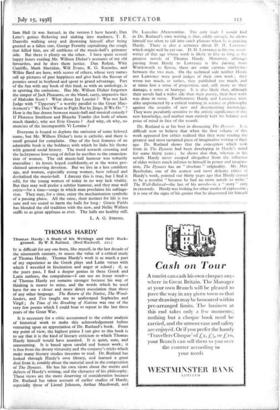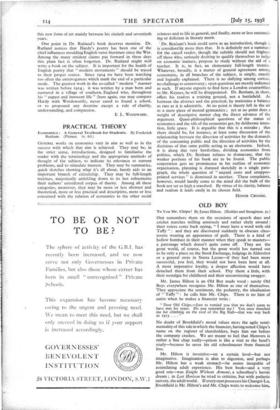Thomas Hardy : A Study of his Writings and their
Back- ground. By W. B. Rutland. (Basil Blackwell. 2ts.)
THOMAS HARDY
IT is difficult for any one born, like myself, in the last decade of the nineteenth century, to assess the value of a critical study of Thomas Hardy. Thomas Hardy's work is as much a part of my experience as the Greek plays and Latin verses with which I wrestled in fascination and anger at school ; if, as the years pass, I find a deeper genius in these Greek and Latin authors, the compulsion—I can use no lesser word— of Thomas Hardy yet remains stronger because his way of thinking is nearer to mine, and the words which he used have for me a closer and more direct association than those of any other language. The Return of the Native, The Wood- landers, and. Tess taught me to understand Sophocles and Virgil ; In Time of the Breaking of Nations was one of the very few poems which I could bear to repeat in the last three years of the Great War.
It is necessary for a critic accustomed to the colder analysis of historical work to make this acknowledgement before venturing upon an appreciation of Dr. Rutland's book. From my point of view, the highest ptaise I can give to this book is to say that it is the kind of literary criticism to which Thomas Hardy himself would have assented. It is quiet, sure, and unassuming. It is based upon careful and honest work; it is free from the dreary virtuosity and the conjurer's tricks which make many literary studies tiresome to read. Dr. Rutland has looked through Hardy's own library, and learned a great deal from it, notably about the material used in the composition of The Dynasts. He has his own views about the merits and defects of Hardy's writing, and the character of his philosophy. These views are the more deserving of _consideration because Dr. Rutland has taken account of earlier studies of Hardy, especially those of Lionel Johnson, Arthur Macdowall, and
Dr. Lascelles Abercrombie. The only fault I would find in Dr. Rutland's own writing is that, oddly enough, he allows himself too often to fall into catch phrases when he is praising Hardy. There is also a sentence about D. H. Lawrence which might well be cut out. D. H. Lawrence is the one novel- writer of this age whose work is likely to live as long as the greatest novels of Thomas Hardy. Moreover, although passing from Hardy to Lawrence is like passing from Wordsworth to Byron, there are some curious similarities between the two men. On the technical side neither Hardy nor Lawrence were good judges of their own work ; they wrote too much, or rather, they published too much, and at times lost a sense of proportion, and, still more to their damage, a sense of humour. It is also likely that, although their novels had a wider sale than their poetry, their best work was done in verse. Furthermore Hardy and Lawrence were alike unprotected by a critical training in science or philosophy against the assaults of new and disconcerting knowledge. They were peculiarly sensitive to the artistic significance of this new knowledge, and neither man entirely kept his balance and poise of mind in face of the assault.
Dr. Rutland is at his best in discussing The Dynasts. It is difficult now to believe that when the first volume of this work appeared few critics realised that they were reading the greatest and most sustained piece of imaginative writing of their age. Dr. Rutland shows that the conception which took form in The Dynasts had been developing in Hardy's mind for some thirty years ; he shows also that, whereas in his novels Hardy never escaped altogether from the influence of older writers much inferior to himself in power and imagina- tion, The Dynasts has an " absolute " originality. Mr. Max Beerbohm, one of the acutest • and most delicate critics of Hardy's work, pointed out thirty years ago that Hardy ceased to be a novelist " because he had no more novels to write." The Well-Beloved—the last of his novels—is a " story " only in externals. Hardy was looking for other modes of expression ; it is one of the signs of his genius that he discovered for himself
this new form of art mainly between his sixtieth and seventieth years.
One point in Dr. Rutland's book deserves mention. Dr. Rutland notices that Hardy's poetry has been one of the chief influences moulding English verse literature since the War. Among the many strident claims put forward in these days this plain fact is often forgotten. Dr. Rutland might well write a book on the subject. It is important for the health of English poetry that " modern movements " should be traced to their proper source. Since 1914 we have been watching too often the extravagances which mark the end of a particular mode. The greatest work in the so-called " modem " manner was written before 1914 ; it was written by a man born and nurtured in a village of southern. England who, throughout his " august and innocent life " (here again, one may compare Hardy with Wordsworth), never cared to found a school, or to propound any doctrine except a rule of charity, understanding, and compassion.
E. L. WOODWARD.











































 Previous page
Previous page